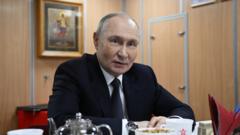As the war enters its fourth year, the situation remains complex, with both sides grappling over conditions for a ceasefire, and Putin's remarks reflecting his broader strategy to undermine Kyiv's authority.
---
In a striking address, Russian President Vladimir Putin proposed that Ukraine could benefit from temporary United Nations governance to enable the establishment of a "competent" government that could be trusted by the people for future elections. This statement is an apparent tactic to undermine the legitimacy of Kyiv’s current administration, led by President Volodymyr Zelensky.
Putin's comments have ignited swift backlash from Ukraine, which accused him of attempting to distract from pressing peace negotiations driven by U.S. mediation efforts. The White House quickly reaffirmed that any decision about Ukraine's leadership rests solely with its citizens, emphasizing their constitutional right to self-governance.
This proposal comes in the context of a burgeoning peace dialogue, alongside recent agreements promising limited ceasefires in the high-stakes Black Sea region. Yet Russia's insistence on lifting specific Western sanctions as a precondition for the ceasefire raised alarms among observers, suggesting attempts to derail genuine negotiations.
Speaking from Murmansk, Putin highlighted that discussions on UN oversight could include various international stakeholders, believing it to be a pathway to hold elections where a 'capable' government could be established to facilitate a lasting peace agreement. However, critics argue that the hurdles of holding fair elections during a time of war make Putin’s push an impractical distraction rather than a viable solution.
Zelensky's administration has emphasized that martial law and the ongoing conflict have made elections unfeasible, pointing out the significant displacement of citizens. As such, Ukraine’s officials have framed Putin's proposition as a strategic maneuver to create doubts about Zelensky's authority and to stall peace efforts while Russia continues its military operations.
Amidst these developments, U.S. officials reiterated their stance that governance in Ukraine is a domestic matter, thereby dismissing Putin's claims. With the narrative of control and legitimacy being central to the ongoing discourse, both sides remain entrenched with little indication of imminent resolution.
---
In a striking address, Russian President Vladimir Putin proposed that Ukraine could benefit from temporary United Nations governance to enable the establishment of a "competent" government that could be trusted by the people for future elections. This statement is an apparent tactic to undermine the legitimacy of Kyiv’s current administration, led by President Volodymyr Zelensky.
Putin's comments have ignited swift backlash from Ukraine, which accused him of attempting to distract from pressing peace negotiations driven by U.S. mediation efforts. The White House quickly reaffirmed that any decision about Ukraine's leadership rests solely with its citizens, emphasizing their constitutional right to self-governance.
This proposal comes in the context of a burgeoning peace dialogue, alongside recent agreements promising limited ceasefires in the high-stakes Black Sea region. Yet Russia's insistence on lifting specific Western sanctions as a precondition for the ceasefire raised alarms among observers, suggesting attempts to derail genuine negotiations.
Speaking from Murmansk, Putin highlighted that discussions on UN oversight could include various international stakeholders, believing it to be a pathway to hold elections where a 'capable' government could be established to facilitate a lasting peace agreement. However, critics argue that the hurdles of holding fair elections during a time of war make Putin’s push an impractical distraction rather than a viable solution.
Zelensky's administration has emphasized that martial law and the ongoing conflict have made elections unfeasible, pointing out the significant displacement of citizens. As such, Ukraine’s officials have framed Putin's proposition as a strategic maneuver to create doubts about Zelensky's authority and to stall peace efforts while Russia continues its military operations.
Amidst these developments, U.S. officials reiterated their stance that governance in Ukraine is a domestic matter, thereby dismissing Putin's claims. With the narrative of control and legitimacy being central to the ongoing discourse, both sides remain entrenched with little indication of imminent resolution.



















